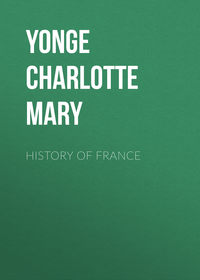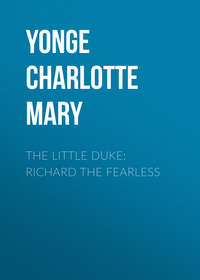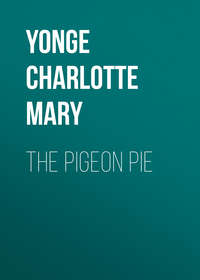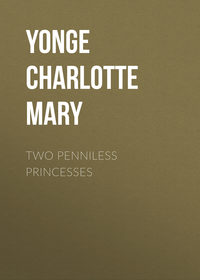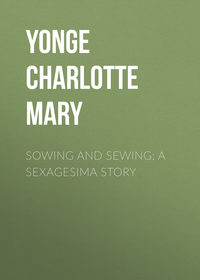
Chantry House
So when Martyn started as pioneer on the morning before the others arrived, he descended into Beachharbour later than he intended, but still he was in time to meet Anne Fordyce, a tall, bright-faced girl of fourteen, taking her after-lessons turn on the parade with a governess, who looked amazed as the two met, holding out both hands to one another, with eager joy and welcome.
It was not the same when Anne flew into the Vicarage with the rapturous announcement, ‘Here’s Martyn!’ The vicar was gone to a clerical meeting, and Mrs. Fordyce said nothing about staying to see him. The luncheon was a necessity, but with quiet courtesy Martyn was made to understand that he was regarded as practically out of reach, and ‘Oh, mamma, he could come and sleep,’ was nipped in the utterance by ‘Martyn is busy with his studies; we must not disturb him.’ This was a sufficient intimation that Mrs. Fordyce did not intend to have the pupils dropping in on her continually, and making her house their resort; and while Martyn was digesting the rebuff, the governess carried Anne off to prepare for a music lesson, and her mother gave no encouragement to lingering or repeating the visit.
Still Martyn, on his way homewards, based many hopes on the return of Mr. Fordyce; but all that ensued was, three weeks later, a note regretting the not having been able to call, and inviting the whole party to a great school-feast on the anniversary of the dedication of the first of the numerous new churches of Beachharbour. There was no want of cordiality on that occasion, but time was lacking for anything beyond greetings and fleeting exchanges of words. Parson Frank tried to talk to Martyn, bemoaned the not seeing more of him, declared his intentions of coming to the farm, began an invitation, but was called off a hundred ways; and Anne was rushing about with all the children of the place, gentle and simple, on her hands. Whenever Martyn tried to help her, he was called off some other way, and engaged at last in the hopeless task of teaching cricket where these fisher boys had never heard of it.
That was all he saw of our old friends, and he was much hurt by such ingratitude. So were we all, and though we soon acquitted the head of the family of more than the forgetfulness of over occupation, the soreness at his wife’s coldness was not so soon passed over. Yet from her own point of view, poor woman, she might be excused for a panic lest her second daughter might go the way of the first.
CHAPTER XXXVII
OUTWARD BOUND
‘As slow our ship her foamy track Against the wind was cleaving,Her trembling pennant still looked back To the dear isle ’twas leaving.So loath we part from all we love, From all the links that bind us,So turn our hearts as on we rove To those we’ve left behind us.’T. Moore.The first time I saw Clarence’s ménage was in that same summer of poor Martyn’s repulse. My father had come in for a small property in his original county of Shropshire, and this led to his setting forth with my mother to make necessary arrangements, and then to pay visits to old friends; leaving Emily and me to be guests to our brother at Clifton.
We told them it was their harvest honeymoon, and it was funny to see how they enjoyed the scheme when they had once made up their minds to it, and our share in the project was equally new and charming, for Emily and I, though both some way on in our twenties, were still in many respects home children, nor had I ever been out on a visit on my own account. The yellow chariot began by conveying Emily and me to our destination.
Clifton has grown considerably since those days, and terraces have swallowed up the site of what the post-office knew as Prospect Cottage, but we were apt to term the doll’s house, for, as Emily said, our visit there had something the same effect as a picnic or tea drinking at little Anne’s famous baby house. In like manner, it was tiny, square, with one sash-window on each side of the door, but it was nearly covered with creepers, odds and ends which Clarence brought from home, and induced to flourish and take root better than their parent stocks. In his nursery days his precision had given him the name of ‘the old bachelor,’ and he had all a sailor’s tidiness. Even his black cat and brown spaniel each had its peculiar basket and mat, and had been taught never to transgress their bounds or interfere with one another; and the effect of his parlour, embellished as it was in our honour, was delightful. The outlook was across the beautiful ravine, into the wooded slopes on the further side, and, on the other side, down the widening cleft to that giddy marvel, the suspension bridge, with vessels passing under it, and the expanse beyond.
Most entirely we enjoyed ourselves, making merry over Clarence’s housekeeping, employing ourselves after our wonted semi-student, semi-artist fashion in the morning; and, when our host came home from business, starting on country expeditions, taking a carriage whenever the distance exceeded Emily’s powers of walking beside my chair; sketching, botanising, or investigating church architecture, our newest hobby. I sketched, and the other two rambled about, measuring and filling up archæological papers, with details of orientation, style, and all the rest, deploring barbarisms and dilapidations, making curious and delightful discoveries, pitying those who thought the Dun Cow’s rib and Chatterton’s loft the most interesting features of St. Mary’s Redcliff, and above all rubbing brasses with heel ball, and hanging up their grim effigies wherever there was a vacant space on the walls of our doll’s house.
And though we grumbled when Clarence was detained at the office later than we expected, this was qualified by pride at feeling his importance there as a man in authority. It was, however, with much dismay and some inhospitality that we learnt that a young man belonging to the office—in fact, Mr. Frith’s great-nephew—was coming to sail for Canton in one of the vessels belonging to the firm, and would have to be ‘looked after.’ He could not be asked to sleep at Prospect Cottage, for Emily had the only spare bedchamber, and Clarence had squeezed himself into a queer little dressing closet to give me his room; but the housekeeper (a treasure found by Gooch) secured an apartment in the next house, and we were to act hosts, much against our will. Clarence had barely seen the youth, who had been employed in the office at Liverpool, living with his mother, who was in ill-health and had died in the last spring. The only time of seeing him, he had seemed to be a very shy raw lad; but, ‘poor fellow, we can make the best of him,’ was the sentiment; ‘it is only for one night.’ However, we were dismayed when, as Emily was in the crisis of washing-in a sky, it was announced that a gentleman was asking for Mr. Winslow. Churlishness bade us despatch him to the office, but humanity prevailed to invite him previously to share our luncheon. Yet we doubted whether it had not been a cruel mercy when he entered, evidently unprepared to stumble on a young lady and a deformed man, and stammering piteously as he hoped there was no mistake—Mr. Winslow—Prospect, etc.
Emily explained, frustrating his desire to flee at once to the office, and pointing out his lodging, close at hand, whence he was invited to return in a few minutes to the meal.
We had time for some amiable exclamations, ‘The oaf!’ ‘What a bore!’ ‘He has spoilt my sky!’ ‘I shan’t finish this to-day!’ ‘Shall we order a carriage and take him to the office; we can’t have him on our hands all the afternoon?’ ‘And we might get the new number of Nicholas Nickleby.’
N.B.—Perhaps it was Oliver Twist or The Old Curiosity Shop—I am not certain which was the current excitement just then; but I am quite sure it was Mrs. Nickleby who first disclosed to us that our guest had a splendid pair of dark eyes. Hitherto he had kept them averted in the studious manner I have often noticed in persons who did not wish to excite suspicion of staring at my peculiarities; but that lady’s feelings when her neighbour’s legs came down her chimney were too much for his self-consciousness, and he gave a glance that disclosed dark liquid depths, sparkling with mirth. He was one number in advance of us, and could enlighten us on the next stage in the coming story; and this went far to reconcile us to the invasion, and to restore him to the proper use of his legs and arms—and very shapely limbs they were, for he was a slim, well-made fellow, with a dark gipsy complexion, and intelligent, honest face, altogether better than we expected.
Yet we could have groaned when in the evening, Clarence brought him back with tidings that something had gone wrong with the ship. If I tried to explain, I might be twitted with,
‘The bowsprit got mixed with the rudder sometimes.’But of course Clarence knew all about it, and he thought it unlikely that the vessel would be in sailing condition for a week at soonest. Great was our dismay! Getting through one evening by the help of walking and then singing was one thing, having the heart of our visit consumed by an interloper was another; though Clarence undertook to take him to the office and find some occupation for him that might keep him out of our way. But it was Clarence’s leisure hours that we begrudged; though truly no one could be meeker than this unlucky Lawrence Frith, nor more conscious of being an insufferable burthen. I even detected a tear in his eye when Clarence and Emily were singing ‘Sweet Home.’
‘Do you know,’ said Clarence, on the second evening, when his guest had gone to dress for dinner, ‘I am very sorry for that poor lad. It is only six weeks since he lost his mother, and he has not a soul to care for him, either here or where he is going. I had fancied the family were under a cloud, but I find it was only that old Frith quarrelled with the father for taking Holy Orders instead of going into our house. Probably there was some imprudence; for the poor man died a curate and left no provision for his family. The only help the old man would give was to take the boy into the office at Liverpool, stopping his education just as he was old enough to care about it. There were a delicate mother and two sisters then, but they are all gone now; scarlet fever carried off the daughters, and Mrs. Frith never was well again. He seems to have spent his time in waiting on her when off duty, and to have made no friends except one or two contemporaries of hers; and his only belongings are old Frith and Mrs. Stevens, who are packing him off to Canton without caring a rap what becomes of him. I know what Mrs. Stevens is at; she comes up to town much oftener now, and has got her husband’s nephew into the office, and is trying to get everything for him; and that’s the reason she wants to keep up the old feud, and send this poor Lawrence off to the ends of the earth.’
‘Can’t you do anything for him?’ asked Emily. ‘I thought Mr. Frith did attend to you.’
Clarence laughed. ‘I know that Mrs. Stevens hates me like poison; but that is the only reason I have for supposing I might have any influence.’
‘And can’t you speak to Mr. Castleford?’
‘Set him to interfere about old Frith’s relations! He would know better! Besides, the fellow is too old to get into any other line—four-and-twenty he says, though he does not look it; and he is as innocent as a baby, indifferent just now to what becomes of him, or whither he goes; it is all the same to him, he says; there is no one to care for him anywhere, and I think he is best pleased to go where it is all new. And there, you see, the poor lad will be left to drift to destruction—mother’s darling that he has been—just for want of some human being to care about him, and hinder his getting heartless and reckless!’
Clarence’s voice trembled, and Emily had tears in her eyes as she asked if absolutely nothing could be done for him. Clarence meant to write to Mr. Castleford, who would no doubt beg the chaplain at the station to show the young man some kindness; also, perhaps, to the resident partner, whom Clarence had looked at once over his desk, but in his rawest and most depressed days. The only clerk out there, whom he knew, would, he thought, be no element of safety, and would not like the youth the better either for bringing his recommendation or bearing old Frith’s name.
We were considerably softened towards our guest, though the next time Emily came on him he was standing in the hall, transfixed in contemplation of her greatest achievement in brass-rubbing, a severe and sable knight with the most curly of nostrils, the stiffest and straightest of mouths, hair straight on his brows, pointed toes joined together below, and fingers touching over his breast. There he hung in triumph just within the front door, fluttering and swaying a little on his pins whenever a draught came in; and there stood Lawrence Frith, freshly aware of him, and unable to repress the exclamation, ‘I say! isn’t he a guy?’
‘Sir Guy de Warrenne,’ began Emily composedly; ‘don’t you see his coat of arms? “chequy argent and azure.”’
‘Does your brother keep him there to scare away the tramps?’
Emily’s countenance was a study.
The subject of brasses was unfolded to Lawrence Frith, and before the end of the week he had spent an entire day on his hands and knees, scrubbing away with the waxy black compound at a figure in the Cathedral—the office-work, as we declared, which Clarence gave him to do. In fact he became so thoroughly infected that it was a pity that he was going where there would be no exercise in ecclesiology—rather the reverse. Embarrassment on his side, and hostility on ours, may be said to have vanished under the influence of Sir Guy de Warrenne’s austere countenance. The youth seemed to regard ‘Mr. Winslow’ in the light of a father, and to accept us as kindly beings. He ceased to contort his limbs in our awful presence, looked at me like as an ordinary person, and even ventured on giving me an arm. He listened with unfeigned pleasure to our music, perilled his neck on St. Vincent’s rocks in search of plants, and by and by took to hanging back with Emily, while Clarence walked on with me, to talk to her out of his full heart about his mother and sisters.
Three weeks elapsed before the Hoang-ho was ready to sail, and by that time Lawrence knew that there were some who would rejoice in his success, or grieve if things went ill with him. Clarence and I had promised him long home letters, and impressed on him that we should welcome his intelligence of himself. For verily he had made his way into our hearts, as a thoroughly good-hearted, affectionate being, yearning for something to cling to; intelligent and refined, though his recent cultivation had been restricted, soundly principled, and trained in religious feelings and habits, but so utterly inexperienced that there was no guessing how it might be with him when cast adrift, with no object save his own maintenance, and no one to take an interest in him.
Clarence talked to him paternally, and took him to second-hand shops to provide a cheap library of substantial reading, engaging to cater for him for the future, not omitting Dickens; and Emily worked at providing him with the small conveniences and comforts for the voyage that called for a woman’s hand. He was so grateful that it was like fitting out a dear friend or younger brother.
‘I wonder,’ said Clarence, as he walked by my chair on one of the last days, ‘whether it was altogether wise to have this young Frith here so much, though it could hardly have been helped.’
To which I rejoined that it could hardly have displeased the uncle, and that if it did, the youth’s welfare was worth annoying him for.
‘I meant something nearer home,’ said Clarence, and proceeded to ask if I did not think Lawrence Frith a good deal smitten with Emily.
To me it seemed an idea not worth consideration. Any youth, especially one who had lived so secluded a life, would naturally be taken by the first pleasing young woman who came in his way, and took a kindly interest in him; but I did not think Emily very susceptible, being entirely wrapped up in home and parish matters; and I reminded Clarence that she had not been loverless. She had rejected the Curate of Hillside; and we all saw, though she did not, that only her evident indifference kept Sir George Eastwood’s second son from making further advances.
Clarence was not convinced. He said he had never seen our sister look at either of these as she did when Lawrence came into the room; and there was no denying that there was a soft and embellishing light on her whole countenance, and a fresh sweetness in her voice. But then he seemed such a boy as to make the notion ridiculous; and yet, on reckoning, it proved that their years were equal. All that could be hoped was that the sentiment, if it existed, would not discover itself before they parted, so as to open their eyes to the dreariness of the prospect, and cause our mother to think we had betrayed our trust in the care of our sister. As we could do nothing, we were not sorry that this was the last day. Clarence was to go on board with Frith, see him out of the river, and come back with the pilot; and we all drove down to the wharf together; nobody saying much by the way, except the few jerky remarks we brothers felt bound to originate and reply to.
Emily sat very still, her head bent under her shading bonnet—I think she was trying to keep back tears for the solitary exile; and Lawrence, opposite, was unable to help watching her with wistful eyes, which would have revealed all, if we had not guessed it already. It might be presumptuous, but it made us very sorry for him.
When the moment of parting came, there was a wringing of hands, and, ‘Thank you, thank you,’ in a low, broken, heartfelt voice, and to Emily, ‘You have made life a new thing to me. I shall never forget,’ and the showing of a tiny book in his waistcoat pocket.
When the two had disappeared, Emily, no longer restraining her tears, told me that she had exchanged Prayer-books with him, and they were to read the Psalms at the same time every day. ‘I thought it might be a help to him,’ she said simply.
Nor was there any consciousness in her talk as she related to me what he had told her about his mother and sisters, and his dreary sense of piteous loneliness, till we had adopted him as a brother—in which capacity I trusted that she viewed him.
However, Clarence had been the recipient of all the poor lad’s fervent feelings for Miss Winslow, how she had been a new revelation to his desolate spirit, and was to be the guiding star of his life, etc., etc., all from the bottom of his heart, though he durst not dream of requital, and was to live, not on hope, but on memory of the angelic kindness of these three weeks.
It was impossible not to be touched, though we strove to be worldly wise old bachelors, and assured one another that the best and most probable thing that could happen to Lawrence Frith would be to have his dream blown away by the Atlantic breezes, and be left open to the charms of some Chinese merchant’s daughter.
CHAPTER XXXVIII
TOO LATE
‘Thus Esau-like, our Father’s blessing miss,Then wash with fruitless tears our faded crown.’Keble.After such a rebuff as Martyn had experienced at Beachharbour, he no longer haunted its neighbourhood, but devoted the long vacation of the ensuing year to a walking tour in Germany, with one or two congenial spirits, who shared his delight in scenery, pictures, and architecture.
By and by he wrote to Clarence from Baden Baden—
‘Whom do you think I should find here but Griffith and his bird? I first spotted the old fellow smoking under a tree in the Grand Platz, but he looked so seedy and altered altogether that I was not sure enough of him to speak, especially as he showed no signs of knowing me. (He says it was my whiskers that stumped him.) I made inquiries and found that they figured as “Sir Peacock and lady,” but they were entered all right in the book. He is taking the “Kür”—he looks as if he wanted it—and she is taking rouge et noir. I saw her at the salon, with her neck grown as long as her namesake’s, but not as pretty, claws to match, thin and painted, as if the ruling passion was consuming her. Poor old Griff! he was glad enough to see me, but he is wofully shaky, and nearly came to tears when he asked after Ted and all at home. They had an upset of their carriage in Vienna last winter, and he got some twist, or other damage, which he thought nothing of, but it has never righted itself; I am sure he is very ill, and ought to be looked after. He has had only foreign doctoring, and you know he never was strong in languages. I heard of the medico here inquiring what precise symptom der Englander meant by being “down in zie mout!” Poor Griff is that, whatever else he is, and Selina does not see it, nor anything else but her rouge et noir table. I am afraid he plays too, when he is up to it, but he can’t stand much of the stuffiness of the place, and he respects my innocence, poor old beggar; so he has kept out of it, since we have been here. He seems glad to have me to look after him, but afraid to let me stay, for fear of my falling a victim to the place. I can’t well tell him that there is a perpetual warning to youth in the persons of himself and his Peacock. His mind might be vastly relieved if I were out of it, but scarcely his body; and I shall not leave him till I hear from home. Thomson says I am right. I should like to bring the poor old man home for advice, especially if my lady could be left behind, and by all appearances she would not object. Could not you come, or mamma? Speak to papa about it. It is all so disgusting that I really could not write to him. It is enough to break one’s heart to see Griff when he hears about home, and Edward, and Emily. I told him how famously you were getting on, and he said, “It has been all up, up with him, all down, down with me,” and then he wanted me to fix my day for leaving Baden, as if it were a sink of infection. I fancy he thinks me a mere infant still, for he won’t heed a word of advice about taking care of himself and will do the most foolish things imaginable for a man in his state, though I can’t make out what is the matter with him. I tried both French and Latin with his doctor, equally in vain.’
There was a great consultation over this letter. Our parents would fain have gone at once to Baden, but my father was far from well; in fact, it was the beginning of the break-up of his constitution. He had been ageing ever since his disappointment in Griffith, and though he had so enjoyed his jaunt with my mother that he had seemed revived for the time, he had been visibly failing ever since the winter, and my mother durst not leave him. Indeed she was only too well aware that her presence was apt to inspire Selina with the spirit of contradiction, and that Clarence would have a better chance alone. He was to go up to London by the mail train, see Mr. Castleford, and cross to Ostend.
A valise from the lumber-room was wanted, and at bedtime he went in quest of it. He came back white and shaken; and I said—
‘You have not seen her?’
‘Yes, I have.’
‘It is not her time of year.’
‘No; I was not even thinking of her. There was none of the wailing, but when I looked up from my rummaging, there was her face as if in a window or mirror on the wall.’
‘Don’t dwell on it’ was all I could entreat, for the apparition at unusual times had been mentioned as a note of doom, and not only did it weigh on me, but it might send Clarence off in a desponding mood. Tidings were less rapid when telegraphs were not, and railways incomplete. Clarence did not reach Baden till ten days after the despatch of Martyn’s letter, and Griffith’s condition had in the meantime become much more serious. Low fever had set in, and he was confined to his dreary lodgings, where Martyn was doing his best for him in an inexperienced, helpless sort of way, while Lady Peacock was at the salle, persisting in her belief that the ailment was a temporary matter. Martyn afterwards declared that he had never seen anything more touching than poor Griff’s look of intense rest and relief at Clarence’s entrance.
On the way through London, by the assistance of Mr. Castleford, Clarence had ascertained how to procure the best medical advice attainable, and he was linguist enough to be an adequate interpreter. Alas! all that was achieved was the discovery that between difficulties of language, Griff’s own indifference, and his wife’s carelessness, the injury had developed into fatal disease. An operation might yet save him, if he could rally enough for it, but the fever was rapidly destroying his remaining strength. Selina ascribed it to excitement at meeting Martyn, and indeed he had been subject to such attacks every autumn. Any way, he had no spirits nor wish for improvement. If his brothers told him he was better, he smiled and said it was like a condemned criminal trying to recover enough for the gallows. His only desire was to be let alone and have Clarence with him. He had ceased to be uneasy as to Martyn’s exposure to temptation, but he said he could hardly bear to watch that bright, fresh young manhood, and recollect how few years had passed since he had been such another, nor did he like to have any nurse save Clarence. His wife at first acquiesced, holding fast to the theory of the periodical autumnal fever, and then that the operation would restore him to health; and as her presence fretted him, and he received her small attentions peevishly, she persisted in her usual habits, and heard with petulance his brothers’ assurances of his being in a critical condition, declaring that it was always thus with these fevers—he was always cross and low-spirited, and no one could tell what she had undergone with him.




